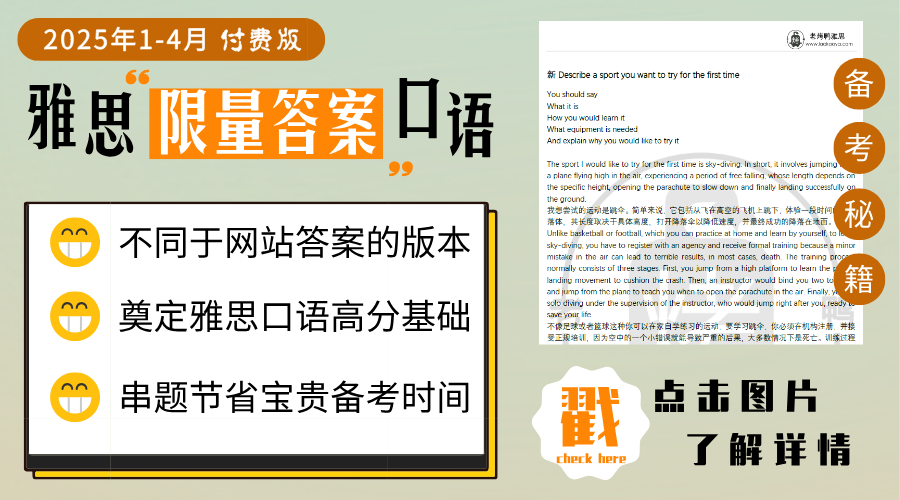剑桥雅思5 Test 2阅读Passage 2答案解析 what‘s so funny 幽默研究
剑桥雅思5阅读第二套题目第二篇文章的14道题由7道TRUE/FALSE/NOT GIVEN,3道图表填空,以及4道句子匹配题构成。虽说这篇文章充满了各种各样的学术词汇,让人看的有些晕头转向,但题目反而不是很难。只要找对了位置就能做。下面是具体每道题的答案解析。
点击查看这篇雅思阅读对应的原文翻译以及其中出现的需要大家掌握的重点词汇:
剑桥雅思5 Test 2阅读Passage 2原文翻译 what’s so funny 关于幽默的最新研究
雅思真题阅读词汇 剑桥雅思5 test 2 passage 2 幽默的研究
剑桥雅思5 Test 2 Passage 2阅读答案解析
第14题答案:FALSE
对应原文:第1段:The writer Arthur Koestler dubbed it the luxury reflex: ‘unique in that it serves no apparent biological purpose’.
解析:通过人名定位到第1段的最后一句话,发现这个人的观点是“笑没有明显的生物学目的”,这与题干中的biologically important直接冲突,因此判断为FALSE
第15题答案:NOT GIVEN
对应原文:第2段:Plato expressed the idea that humour is simply a delighted feeling of superiority over others.
解析:根据Plato定位到第2段的这句话,humour和above-average都有对应的地方。但原文中完全没有提到智力(intelligence)相关的内容。因此判断为NOT GIVEN
第16题答案:TRUE
对应原文:第2段:Kant and Freud felt that joke-telling relies on building up a psychic tension which is safely punctured by the ludicrousness of the punchline.
解析:根据Kant这一人名定位到第2段。题干中的controled release, nervous与原文中的safely punctured, tense对应,即题干中的每一个信息点都能在原文中找到依据,因此确定答案为TRUE
第17题答案:FALSE
对应原文:第2段:But most modern humour theorists have settled on some version of Aristotle’s belief …
解析:根据Aristotle的人名定位到第2段,原文表达的意思是大多数文章来自老烤鸭雅思幽默理论家都以亚里士多德的想法为基础,而题干中则说他们忽略了(ignore)亚里士多德,因此判断为FALSE
第18题答案:TRUE
对应原文:第3段:Graeme Ritchie … studies the linguistic structure of jokes in order to understand not only humour but language understanding and reasoning in machines.
解析:这道题的关键在于对artificial intelligence(人工智能)的理解上。按照现在的常识,机器语言理解和推理其实就是人工智能很重要的一部分。因此判断答案为TRUE
第19题答案:NOT GIVEN
对应原文:第3段:A comedian will present a situation followed by an unexpected interpretation that is also apt.
解析:根据comedian定位到第3段的最后,发现题干中的personal situations在原文中完全没有出现,也找不到与之相反的地方。因此判断为NOT GIVEN
第20题答案:TRUE
对应原文:第5段:Chimpanzees have a ‘play-face’ – a gaping expression accompanied by a panting ‘ah, ah’ noise.
解析:根据Chimpanzees定位到第5段的中间,题干中的particular noise即对应原文中的‘ah, ah’ noise,因此确定答案为TRUE
第21题答案:problem solving
对应原文:第8段:the listener’s prefrontal cortex lit up, particularly the right prefrontal believed to be critical for problem solving.
解析:根据right prefrontal cortex这一学术名词定位到第8段的这句话,空前词linked to与be critical for对应,由此确定答案为problem sloving
第22题答案:temporal lobes
对应原文:第8段:But there was also activity in the temporal lobes at the side of the head
解析:顺着上一道题往下,发现题干中的too与原文中的also对应,再加上从题干中可以判断出来空上应该填的是某个部位,因此确定答案为temporal lobes
第23题答案:evaluating informaiton
对应原文:第8段:orbital prefrontal cortex. This patch of brain tucked behind the orbits of the eyes is associated with evaluating information.
解析:根据orbital prefrontal cortex定位到这句话,题干中的involved with与原文中的associated with对应,因此确定答案为evaluating information
第24题答案:C
对应原文:第9段:Making a rapid emotional assessment of the events of the moment is an extremely demanding job for the brain, animal or human.
解析:题干中的most difficult与extremely demanding对应,由此确定句子。原文中的意思是说“对事件进行情感评估比较困难”。因此确定C为答案。
第25题答案:A
对应原文:第10段:but humans, who have developed a much more complicated internal life as a result of language, respond emotionally not only to their surroundings, but to their own thoughts.
解析:根据language定位到第10段的这句话,选项A中的react与respond对应,thoughts又是原词重现,因此确定答案为A
第26题答案:F
对应原文:第10段:Whether a joke gives pleasure or pain depends on a person’s outlook.
解析:这道题没有明显的定位词,只能从上道题对应的原文往下找。发现选项F中subjective views与outlook对应,由此确定答案。
第27题答案:D
对应原文:第11段:If we can figure out how the mind processes humour, then we’ll have a pretty good handle on how it works in general.’
解析:根据题干中的人名定位到第11段的这句话,D选项的brain和operation与原文中的mind和work同义替换,因此确定答案。
剑桥雅思5 Test 2阅读Passage 1答案解析 Bakelite-the birth of modern plastics 现代塑料的诞生
剑桥雅思5 Test 2阅读Passage 3答案解析 The Birth of Scientific English 科学英语的诞生


